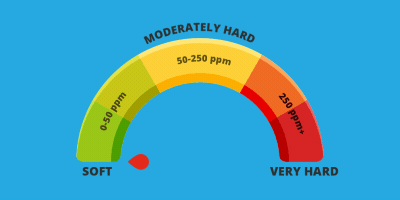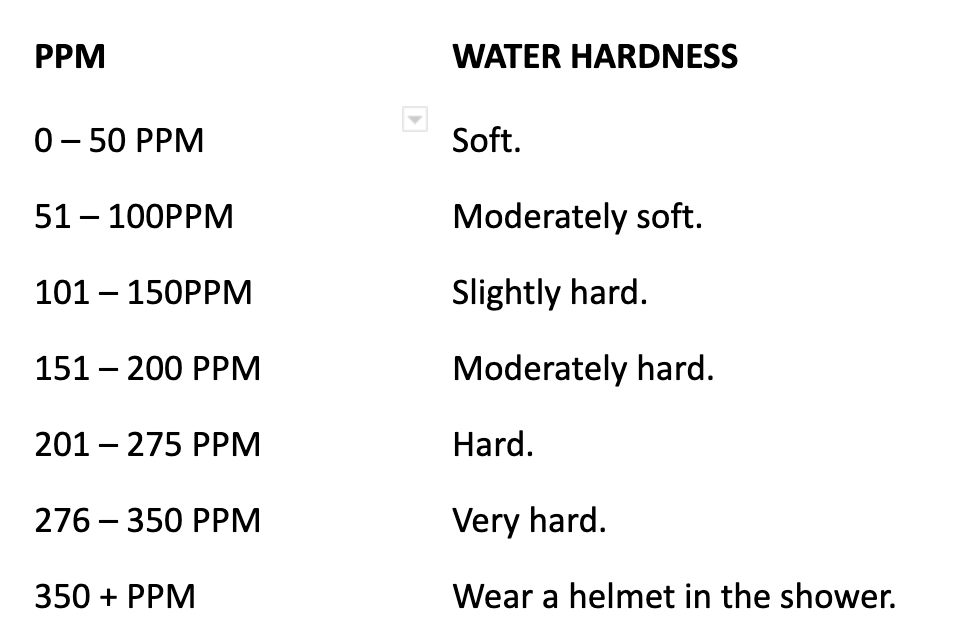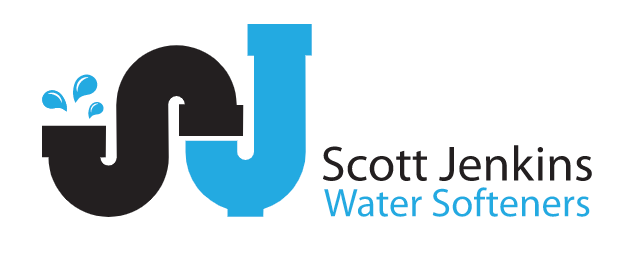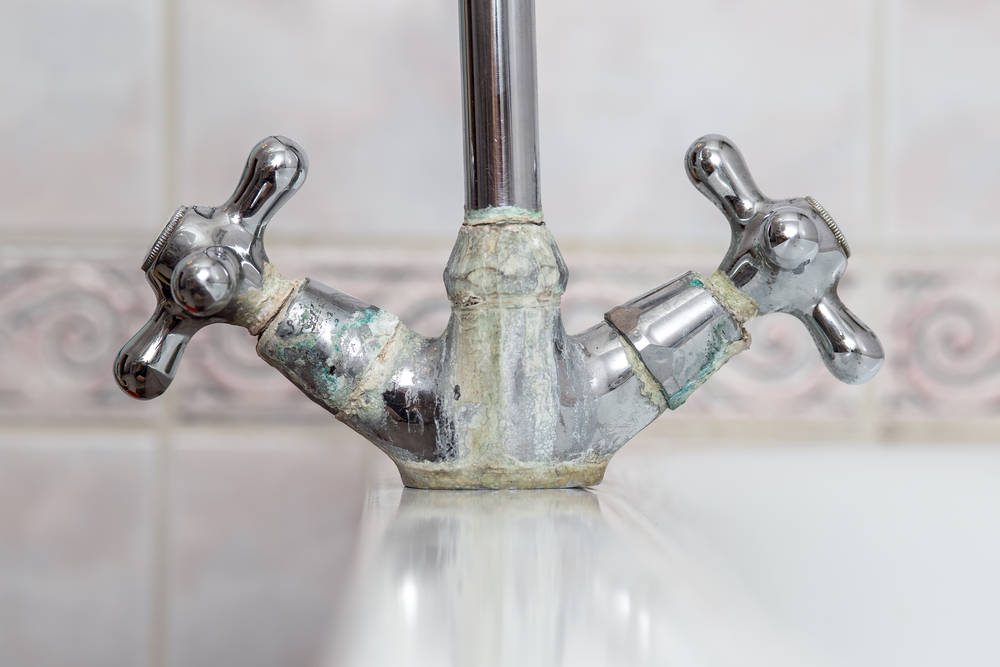How hard is the water in West Sussex?

Why is the water in West Sussex so hard?
This isn’t just something that’s suddenly happened. For as long as it has rained, across the county of West Sussex the hardness of the water has been a feature. It varies a little from place to place but, by and large, most areas of West Sussex have a water hardness reading of over 250ppm (parts per million). Any reading above 200ppm is considered hard.
Rainfall actually produces soft water but when it reaches ground level it doesn’t necessarily stay that way! West Sussex is famous for its chalk and clay soil, which is rich in minerals like calcium and magnesium. When the rain drains into the soil, these minerals have the effect of turning the water from soft to hard.
The best way to counter hard water is to have a water softener installed, which is why soft water systems are so prevalent in households throughout West Sussex. Incidentally, if you have a water softener fitted, you’ll find your water hardness reading will drop dramatically, all the way down to zero ppm!
West Sussex – an Overview
Annual rainfall: 15.32inch or 389.2mm.
Wettest month – January 1.86inch or 47.3mm
West Sussex is a coastal county in South East England, bordering Hampshire to the west, Surrey to the north and East Sussex to the east. It comprises the districts of Adur, Arun, Chichester, Horsham and Mid Sussex, as well as the boroughs of Crawley and Worthing. Covering an area of 769 square miles, the administrative headquarters are in the county’s only city, Chichester. In the 2011 census, West Sussex recorded a population of 806,900.
Steeped in history, West Sussex has settlements that date back to the Lower Paleolithic era and it is also famous for its Roman conquests. The Saxons established the Kingdom of Sussex in the year 477.
The county has a wonderful variety of scenery, featuring downland, wealden and coastal vistas. More than 50% of the county is protected countryside, offering an attractive range of walking, cycling and other recreational opportunities. At 919ft, Blackdown is the highest point. West Sussex also features a number of castles and stately homes, including Arundel Castle, the seat of the Duke of Norfolk, Goodwood and Petworth House.
How can I reduce the water hardness in my home?
The most effective way to overcome the drawbacks of hard water is to have a domestic or commercial water softener fitted, in your home or business premises. You may wish to leave your drinking water unsoftened to make it more palatable. It is perfectly possible to filter out your drinking water supply from the rest of your softened mains supply.
What is a water softener and how does it work?
It attaches directly to the mains water supply and works by flushing out the hard water particles. This is done through a process known as “ion exchange” which removes the calcium and magnesium minerals. The high-quality softeners we sell are filled with food-grade resin beads that are dosed with sodium ions. As the water passes through the softener’s tanks, the resin beads attract and hold on to the magnesium and calcium minerals and “exchange” the sodium ions. It is this process which makes the water soft, thereby eliminating any threat of limescale build-up.
Depending on the amount of water you use, your softener will need to regularly “regenerate” to flush away the magnesium and calcium ions on the resin beads. A metering system tells the softener when to regenerate. All you need to do is to make sure the soft water system is replenished with salt, since water softeners require salt to assist with the regeneration process.
The benefits of soft water on your skin, hair and laundry
Soft water will make your skin and hair feel smoother and more silky and you’ll find that your soaps, shampoos and gels go much further.
We know from first-hand experience that skin conditions, like eczema are greatly improved by regular exposure to soft water.
Meanwhile, your laundry will be softer to the touch, the shower screen will stay cleaner and stop looking so stained and your household appliances will run much more efficiently. And you won’t be using up your supplies of Cif or Mr Muscle nearly as fast as you were when you were battling against hard water!
Will a water softener reduce my monthly household bills?
Yes, absolutely! Once you have paid for the initial outlay on the water softener, you’ll start seeing immediate savings on your household bills.
These savings are based on the money that the average family of four will save on shopping and energy bills when a water softener is installed in the home. Working on the basis of a two-bathroom property, the average reduction on general family toiletries and household cleaning products will be in the region of 70%.
In this calculation, we’ve included items such as washing machine and kettle de-scalers, which you wouldn’t need to purchase ever again, once you’ve had a water softener installed. Even if you took out the costs of these sundries, your monthly shopping bill for the above products would fall by around 65% compared to your projected spend without a water softener.
Does a water softener need to be serviced?
To be on the safe side, servicing always makes good sense – for a variety of reasons. Even though, our water softeners are well-built and known for their reliability, designed to last for many years, they work best when well maintained. For this reason, we would always recommend you take out one of our Annual Service Plans.
What does the SJ Water Softeners Annual Service Plan include?
This is a once-yearly health check to ensure your water softener is functioning optimally. We’ll check there are no leaks, that the resin is given a good clean – this is very important – and that everything is on order with the working parts, like the bypass valves and that the overflow is cleared of any blockages.
Being on the annual service plan will not only prolong the life of your water softener, it will also save you any outlay on unexpected maintenance issues.
And you don’t need to be an existing SJ Water Softeners customer to benefit from an Annual Service Plan.
Other Annual Service Plan benefits – Warranties, Parts, Salt
Save money on any parts that need replacing, such as filters – we’ll take £10 off the standard price of a replacement. Plus, we will give you a 10-year warranty on all parts – as opposed to the standard manufacturers’ warranty that you would otherwise receive.
Reduced cost of salt supplies. When we do your yearly Health Check, we’ll stock you with sufficient salt to last until your next annual inspection – saving you money on bulk purchase and on delivery charges.
Mains drinking water and sewerage services in West Sussex
The mains water and sewerage services for West Sussex are provided by a number of suppliers, including Southern Water, South East Water and Portsmouth Water.
What is the problem with hard water?
Firstly, there is nothing inherently bad about hard water. For a start, many people prefer drinking hard water rather than soft, so we aren’t saying that is of no value. BUT, for the majority of time, there are plenty of reasons why you shouldn’t be using hard water – and much of it boils down to limescale.
Limescale build-up occurs when hard water molecules are agitated. This happens when you boil or heat the water in household appliances, such as your central heating boiler, dishwasher, washing machine and kettle. So, every time you cook, clean, wash and put on the heating, the effects of hard water will surface.
What are the common issues with limescale?
If you constantly use hard water in your home, scale will cause a range of problems, all of which will downgrade your household appliances and cost you money.
- Overall reduced efficiency of appliances
- Block valves, reduced diameter of pipework
- Potential for boiler breakdowns
- Increased gas and electricity bills
- Longer household cleaning times
- Poor appearance on surfaces like chrome, granite, glass, Perspex, etc
The effects of hard water on skin, hair and laundry
Hard water is also a big issue for personal hygiene. It dries out your skin and can be especially bad for those suffering from skin conditions, like eczema psoriasis. Hair can look lank after shampooing and your laundry will lose its softness and feel starchy and lifeless, when frequently exposed to hard water. The more you clean, the worse the problem becomes.
Measuring the hardness of your water
The measurement of water hardness is given in particles per million (PPM). The amount of hardness particles that are dissolved in the water are rated, as follows:

How can I reduce the water hardness in my home?
The most effective way to overcome the drawbacks of hard water is to have a domestic or commercial water softener fitted, in your home or business premises. You may wish to leave your drinking water unsoftened Is it okay to drink soft water? – Scott Jenkins Water Softeners in Sussex, Surrey & Hampshire (sjwatersofteners.co.uk)to make it more palatable. It is perfectly possible to filter out your drinking water supply from the rest of your softened mains supply.
What is a water softener and how does it work?
It attaches directly to the mains water supply and works by flushing out the hard water particles. This is done through a process known as “ion exchange” which removes the calcium and magnesium minerals. The high-quality softeners we sell are filled with food-grade resin beads that are dosed with sodium ions. As the water passes through the softener’s tanks, the resin beads attract and hold on to the magnesium and calcium minerals and “exchange” the sodium ions. It is this process which makes the water soft, thereby eliminating any threat of limescale build-up.
Depending on the amount of water you use, your softener will need to regularly “regenerate” to flush away the magnesium and calcium ions on the resin beads. A metering system tells the softener when to regenerate. All you need to do is to make sure the soft water system is replenished with salt, since water softeners require salt to assist with the regeneration process. What is the soft water regeneration process?
A Water softener = Energy efficiency. Here’s why.
Over the course of a year, the average West Sussex household without a water softener will face a significant reduction in energy efficiency, as a result of limescale build-up in the plumbing. Annually, depending on the water hardness measurement, it is likely that there will be a limescale accumulation of up to 1.5mm, which will decrease energy efficiency by as much as 12%. With every passing year, the reduction in energy efficiency will increase – and your fuel bills will keep rising too.
In contrast, the fuel savings from having a water softener and the reduced capital depreciation on the appliances could amount to £240 a year. What’s more, you can have complete confidence in the boiler enjoying a 12-15 year lifespan before you will need to thinking about replacing it.
How much does it cost to run a water softener?
Although most of the water softeners we fit don’t have many moving parts and are extremely reliable and highly unlikely to break down, there are associated servicing costs. On that front, we would certainly recommend that you have a cost-effective Annual Health Check.
Typically, the only on-going cost you would need to consider is for block salt. This will set you back no more than £2 to £7 per person per month, depending on the capacity and usage of your soft water system.
What is the best water softener for me?
Our market-leading selection of Kinetico and EcoWater softeners are designed to suit all requirements and UK plumbing systems. We can discuss the best option for you, based on your budget and anticipated usage. Our ranges start from £1595 for the premium range and up.
The installation cost is £250 for all models connected to the most common 15-22ml pipework. For 28ml pipework, the price may go up to £450 but this will be assessed when we visit. There’s no need to do a site visit prior to installation – we can do both on the same day. The prices you see on the website are definitive and VAT inclusive.
If you aren’t sure which is the right softener for you, by answering these few short questions you’ll be on the right track. Or call us if you have any questions.
I live in West Sussex – how hard is my water?
Here you can find specific water hardness readings for the following locations in West Sussex:
Arundel, Barnham, Burgess Hill, Bognor Regis, Chichester, Crawley, Donnington, East Dean, East Wittering, Felpham, Fishbourne, Haywards Heath, Horsham, Lavant, Littlehampton, Middleton-on-Sea, Selsey, Slindon, Storrington, West Dean, West Wittering, Worthing, Yapton.


